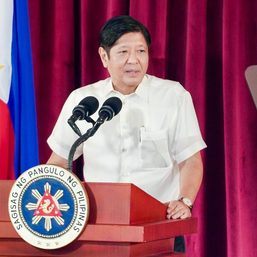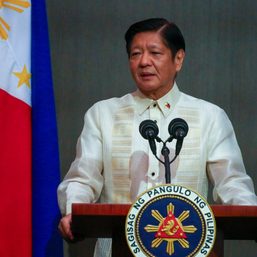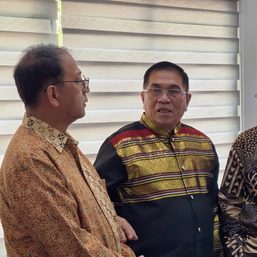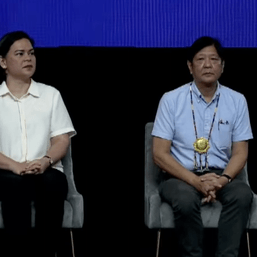SUMMARY
This is AI generated summarization, which may have errors. For context, always refer to the full article.
![[OPINION] The Davos disconnect](https://www.rappler.com/tachyon/2023/01/20230128-davos-disconnect.jpg)
Compared to the amount of criticism leveled against the Marcos administration on the size of its entourage to the World Economic Forum (WEF), the relevance, utility, and purpose of the Davos affair for the public back home, and what must have been the exponential cost burdened on taxpayers, given the number of the delegation relative to those from other by far economically better-off nations, positive news on this latest foreign sortie is scarce. And that is because there is really very little transparency provided to the public.
The only official statement prior to the Davos sortie was that the contentious Maharlika Investment Fund (MIF), which the Senate has yet to deliberate on, was to be presented to the WEF.
The most that the public can deduct from that tiny tidbit is that whatever would be presented would be raw and tentative. That carries with it the relatively positive assumption that the current Senate is an independent body, that it is not a “rubber stamp.” Absent such positivity, should the MIF be railroaded, then we might as well dismiss any notion of checks and balances, given the amount of criticism the MIF has generated from various concerned sectors wary of forcibly funneled funds where no surpluses exist, the most toxic of which is the fear of a money laundering gambit to cleanse long plundered, albeit undiscovered, wealth.
Because of the lack of transparency and trust issues, the public is compelled to speculate on the Marcos administration’s motivations. Unfortunately, doing so adds unhealthy and unproductive uncertainty that worsens when it arrays our poverty-ridden reality against Swiss extravagance – a diametric disconnect from the necessary surplus and plenty that are prerequisites when nations establish sovereign funds such as the MIF.
Already social media is aflame, and both scathing speculation and disinformation are having a heyday. Not only is the remnant credibility of the Marcos administration being torched, but the roasting is also being applied to those who’ve hitched a ride on the Davos bandwagon. Note the handful of A-listers whose combined billions trump the finances of over 55 million Filipinos.
The brickbats range from the petty to the sinister. It began with social media posts that scheduled flights were commandeered to accommodate our unusually large Davos delegation. Allusions, both ominous and satirical, resurrected painful memories of secret Swiss bank accounts and money laundering.
While the diverted flights narrative was patently false, its absurdity ignited a conflagration that included the prohibitively high costs of extravagance burdened on taxpayers, who foot the bill for an oligarchy well-accustomed to finer trappings that the Filipino public can only dream of. The ridiculous official retort is that the benefits will exceed those costs. That assumes an accounting will be made. Note that the economy still continues to pay for the costs of plunder and money laundered half a century ago.
In an economy where rice, sugar, salt, onions, and eggs, all within the typical household food basket and measured by our consumer price index, are priced like luxury goods, the gilded symbolisms of Davos are disconnected from the ordinary Filipinos unrepresented in the Davos bandwagon.
Randomly ask 10 people about Davos. For the 49% wallowing in domestic squalor who rate themselves poor, Davos is a colossal extravagant disconnect, including the brazen Davos soundbite now reverberating, where there was a declaration that the post-dictatorship years were our darkest periods. Such highlights the ascension of lies to the global stage.
Brazen disconnects from established truth are unfortunate given the theme of the WEF for 2023 – “Cooperation in a Fragmented World.”
Allow us a skinny listing of latent WEF themes disconnected from our festering Philippine reality, each debunking one online tabloid that bannered us the “darling” of Davos.
First of all, the WEF is a forum to address global issues and learn best practices in leadership. That second objective is extremely important in our case. Marcos declared in Davos that he entered politics to regain power and cleanse his family’s tarnished reputation.
As for leadership, simply look at the performance, productivity, and competence, or its utter absence, at the Department of Agriculture, which has been endowed with the powers of the presidency.
Again, the WEF theme is “Cooperation in a Fragmented World.” Our specific concern in that area is our relationship with Communist China, who not only claims part of our exclusive territory but uses its military might to forcibly prevent us from benefiting from our marine resources.
Let us go through each of the foregoing.
The backdrops of the WEF 2023 that are likewise thematic, in that they require competent leadership and our full attention, includes rising interest rates and costs of living, a debilitating energy crunch, and an impending global recession.
Our monetary leaders have been aggressively increasing key policy rates. That is zombie economics. It addresses demand-pull inflation. Our inflation is cost-push and not demand-driven.
Note that our food inflation is highest among the region due to incompetent food and agriculture management, where our constant pandering to trader’s interests fails to alleviate the continuing plight of a population dependent on agriculture and now paying the world’s highest prices for kitchen table basics. How indeed can a policy of default importations support local food production?
As for the energy crunch, we remain with one of the highest electricity tariffs in Asia yet are constantly threatened by inadequate baseload supply.
If this is our reality, then how are we the ‘’Darling of Davos?” – Rappler.com
Dean de la Paz is a former investment banker and managing director of a New Jersey-based power company operating in the Philippines. He is the chairman of the board of a renewable energy company and is a retired Business Policy, Finance, and Mathematics professor.
Add a comment
How does this make you feel?
![[ANALYSIS] Marcos at Davos: Economic lies and cherry-picking galore](https://www.rappler.com/tachyon/2023/01/marcos-davos-january-20-2023.jpg?fit=449%2C449)





There are no comments yet. Add your comment to start the conversation.